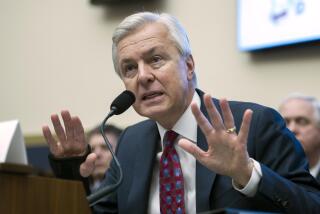FERC Attorneys Back Avista in Enron Probe
- Share via
Federal Energy Regulatory Commission attorneys Tuesday affirmed a finding that Avista Corp., owner of utilities in the Northwest, should be cleared of allegations that it helped Enron Corp. manipulate power prices in California.
The finding puts the attorneys at odds with Curtis Wagner, a FERC law judge who last month cited discrepancies in the hearing transcript in the case when he refused to sign a settlement clearing Spokane, Wash.-based Avista of wrongdoing.
Attorneys said Wagner’s June 25 order contains “misstatements of fact” and does not take into account new information on improper trading tactics allegedly used by Avista, according to the commission’s Web site.
Attorneys reached a settlement with the company in January that would have cleared Avista of serving as a middleman to legitimize trades between Enron and its Portland General Electric utility. In April and June, Wagner refused to certify the accord because Avista was one of several companies named in a probe of the California energy crisis in 2000 and 2001.
Shares of Avista rose 23 cents to $14.64 on the New York Stock Exchange.
Wagner set a new hearing schedule to begin Oct. 27. A final settlement must be approved by the full commission.
During the energy crisis, millions of Californians lost power during six days of rolling blackouts and the state’s largest utility, PG&E; Corp.’s Pacific Gas & Electric, filed for bankruptcy protection after racking up $13 billion in debt buying power on the open market.
Houston-based Enron was the world’s biggest energy trader before filing for bankruptcy in December 2001. It plans to pay most creditors less than one-fifth of the $67 billion they’re owed to exit court protection.
In their latest report, commission attorneys found no evidence that Avista is guilty of market gaming under new definitions of improper trading strategies. The attorneys asked Wagner to reconsider his June 25 decision “to take into account additional clarification and guidance provided in the commission’s show-cause order,” according to filings with FERC.
More to Read
Inside the business of entertainment
The Wide Shot brings you news, analysis and insights on everything from streaming wars to production — and what it all means for the future.
You may occasionally receive promotional content from the Los Angeles Times.










